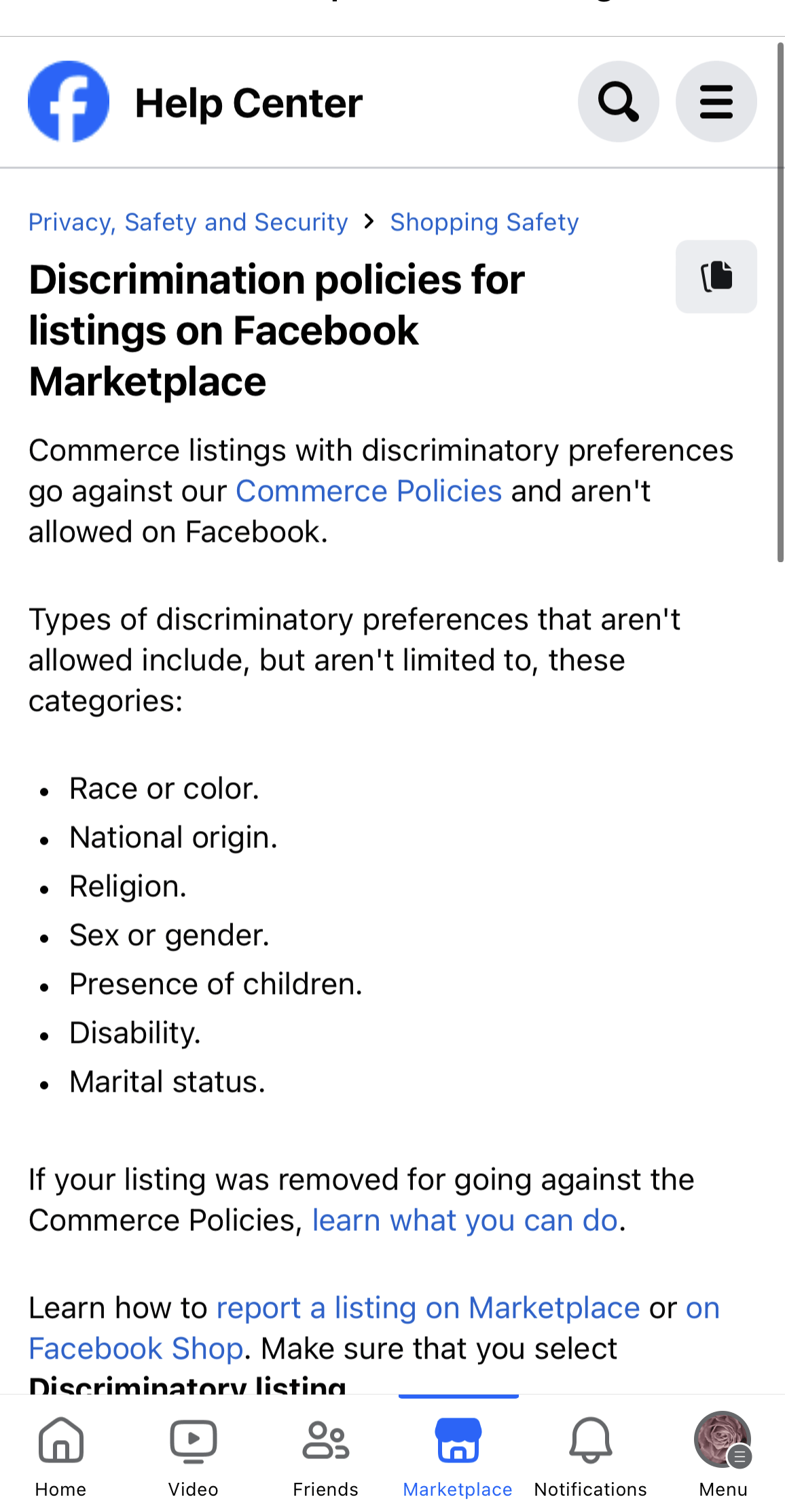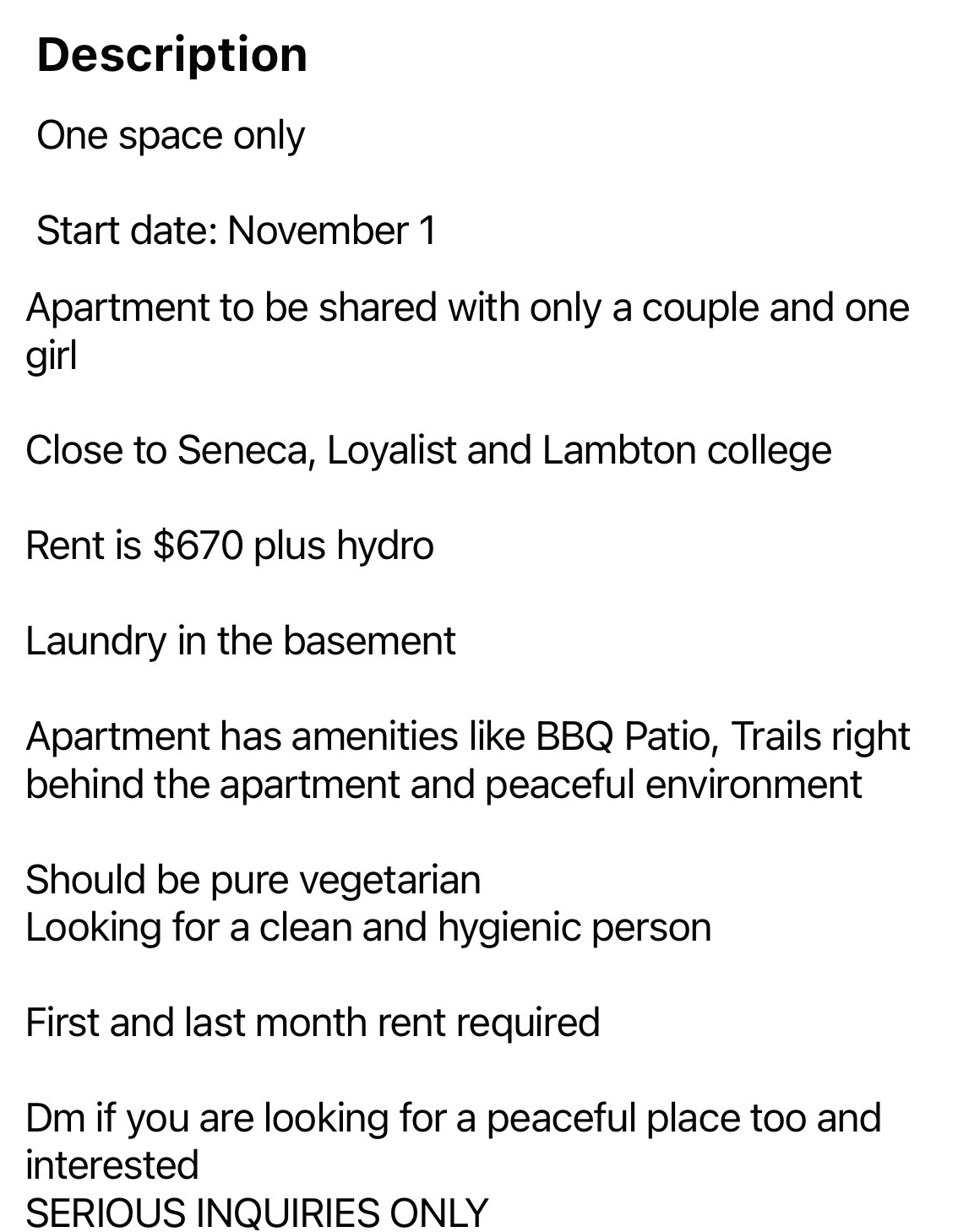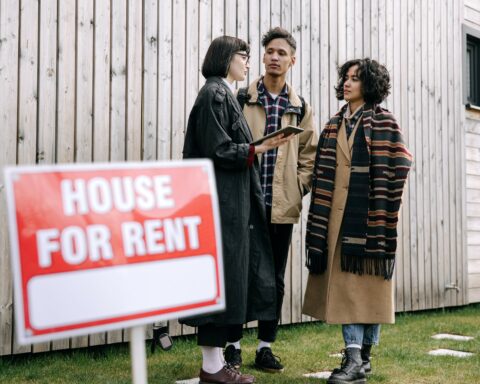This article was produced as part of an Inclusive Journalism Microcredential offered by New Canadian Media and Seneca Polytechnic. Learn more here.
Run a quick search for housing rentals on Facebook Marketplace or Kijiji and you will likely come across a plethora of advertisements that have some variation of: “vegetarians only” or “prefer [people of x community]” in their rental description.
New Canadian Media reached out to a few landlords or subletters to inquire about the room and express interest in renting. Among those who responded, the conversation ended with “Sorry, not available” or eventually, “Other people in this unit are [from said particular community].”
Do social media platforms moderate postings?
 Commerce listings with discriminatory preferences are against Facebook Marketplace policy, and are not allowed. They include, but are not limited to race or colour, national origin, religion, sex or gender, presence of children, disability, and marital status. However, it is only until one reports the listing that Facebook Marketplace may take it down, but that doesn’t deter advertisers from listing their room or unit with discriminatory or restrictive wordings.
Commerce listings with discriminatory preferences are against Facebook Marketplace policy, and are not allowed. They include, but are not limited to race or colour, national origin, religion, sex or gender, presence of children, disability, and marital status. However, it is only until one reports the listing that Facebook Marketplace may take it down, but that doesn’t deter advertisers from listing their room or unit with discriminatory or restrictive wordings.
In an email to NCM, Rentals.ca, a rental marketplace, states that they consider discrimination based on what is indicated in the Ontario Housing Act. “If a listing contains any discriminatory terms and is flagged by a user, or our system, it will be disabled until resolved by the landlord.”
However, they note that a stipulation of “females only” is permissible for subletting, roommate situations, or co-op living. “We want users to feel safe on the platform and welcome them to flag any potentially harmful listings,” the representative said to New Canadian Mediasays.
So, what does the law say?
Essentially, there are two bodies that come into play in such a situation: the Residential Tenancies Act (RTA) and the Ontario Human Rights Commission (OHRC) and Tribunal.
Let’s look at a few scenarios.
The RTA is applicable if you are named on the lease, are renting directly from the landlord, and/or have a roommate. Austen Metcalfe, a human rights and landlord-tenant lawyer with Ontario-based law firm Unified LLP, adds that if you’re already a tenant and the landlord asks you to stop cooking meat, this is an interference in “reasonable enjoyment,” under section 22 of the RTA.
The Advocacy Centre for Tenants Ontario (ACTO), a specialty community legal clinic for housing issues in Ontario, explains that if you share a kitchen or bathroom (that is, an intimate space with the landlord), the occupant has no recourse under the RTA or the Ontario Human Rights Code.
Douglas Kwan, director of advocacy and legal services at ACTO notes that “even if a victim cannot make a claim of discrimination, the other remedies available would be suing the landlord in a civil court for harassment or charges.”
The RTA is also not applicable if you’re not named on the lease and pay rent to a tenant in a shared accommodation. As far as discriminatory advertisements go, one does not have the same rights and privileges as an actual tenant.
If a landlord specifies a particular religious or ethnic group as a condition to renting, it’s a violation of what they’re permitted to ask for and one can bring it up to the Human Rights Tribunal (HRTO), the agency where applications are filed and resolved. Anyone seeking to file an application can get free legal advice and support services, including possible legal representation from the Human Rights Legal Support Centre.
Precarious housing market
 In the context of the Toronto market, Metcalfe notes there’s been an increasing – and worrying – trend of landlords being extremely picky about who they’re renting to. “It’s very difficult to get [accommodation]. And to secure that unit, people are offering more and more things that they don’t need to offer.”
In the context of the Toronto market, Metcalfe notes there’s been an increasing – and worrying – trend of landlords being extremely picky about who they’re renting to. “It’s very difficult to get [accommodation]. And to secure that unit, people are offering more and more things that they don’t need to offer.”
“‘Landlords are not going to say: ‘I’m not renting to you because of your caste, creed, or origin,’” he explains. “They’ll say something along the lines of ‘you don’t have enough references.’”
A student* at the University of Waterloo, Ontario, recounts her experiences last September of seeking accommodation in the area. In one instance, she was asked if she can speak [a particular language] and subsequently, was denied housing.
In another instance, the discrimination was implicit. She responded to a posting on a Facebook group for student housing in the area and was made to jump through several hoops (including submitting signed cheques of advance rent, bank statements, and references). Two days before moving in, she went to meet the renter and was denied housing. She found out, later, that the decision was racially -motivated.
Beyond being discriminatory, these practices also restrict what is available and affordable to people in a precarious housing market. And newcomers – without access to a network, sufficient knowledge of their rights, limited income or savings, and perhaps, a language barrier – are hit the hardest in a difficult market.
“This segregation or discrimination is driving students to end up with unsanitary or unsafe living conditions,” the student says. “Because it is what’s available to them.”
What can one do?
The bottom line is the newcomers and/or renters must make difficult choices.
Discrimination has to happen in the tenancy before one can go to the RTA, but as a prospective tenant, the only option may be to report it to the Tribunal. “But how much energy do you have?” Metcalfe asks, as the practice is so widespread and prevalent. “You may be applying to 30 different places, and you’re not going to go to the HRTO for each one.”
One solution Metcalfe recommends is that newcomers understand their rights and what comes under the purview of RTA versus the Human Rights Code by connecting with legal services like agencies or clinics that offer free legal advice.
*The student at the University of Waterloo requested anonymity because she fears retribution – landlords or subletters may consider her to be a troublemaker, and deny housing.
Note: A clarification was added to this story on Jan. 16, 2024.





